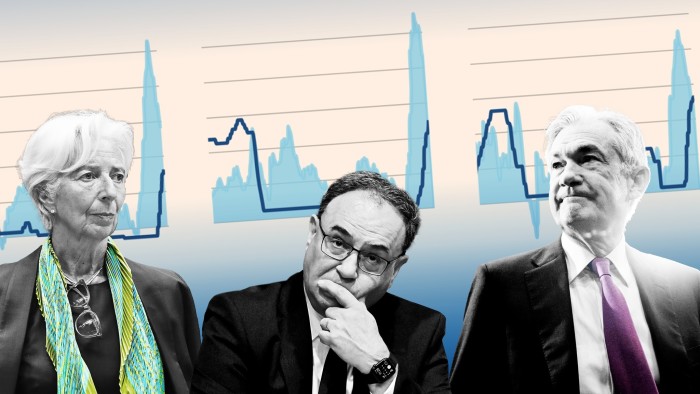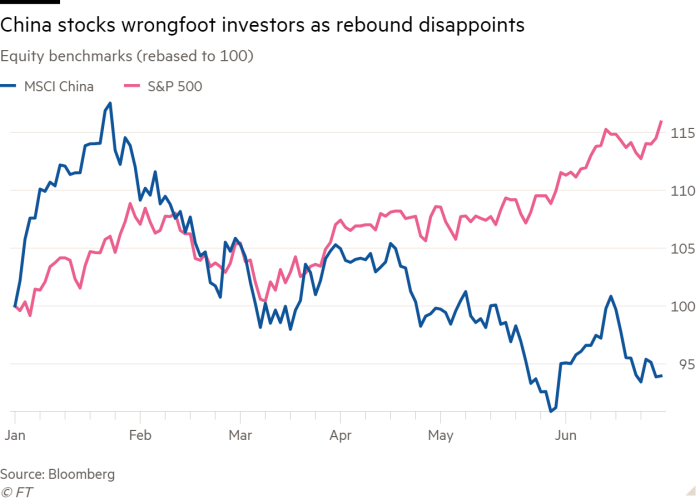
Receive free Global Economy updates
We’ll send you a myFT Daily Digest email rounding up the latest Global Economy news every morning.
Good morning. Trade officials have been assessing the fallout from the latest escalation in the US-China technology battle after Beijing said it would impose curbs on exports of metals used in chipmaking.
South Korea’s commerce ministry convened an emergency meeting to discuss China’s decision to control exports of gallium and germanium, metals used in chips, electric vehicles and a range of telecoms products.
“We can’t rule out the possibility of the measure being expanded to other items,” said Joo Young-joon, South Korea’s deputy commerce minister.
Taiwan’s deputy foreign minister Roy Lee said the export controls “will be a kind of accelerator for countries including Taiwan, South Korea and Japan to reduce our dependence on China for supplies of those critical materials”.
South Korea and Taiwan are home to Samsung and TSMC, companies that dominate semiconductor manufacturing, while Japanese groups play a critical role in the chip supply chain.
Beijing’s announcement on Monday showed how President Xi Jinping’s administration is willing to target western interests in response to Washington tightening curbs on China’s access to sophisticated technology. The metal restrictions are significant because China dominates the production of many raw materials critical to modern technology and infrastructure.
“This looks like a punch from China thrown at the US — a warning about what supply chain disruptions can do to inflation, interest rates and the presidential election,” said CW Chung, an analyst at Nomura, in Singapore.
-
Looking ahead: US Treasury secretary Janet Yellen’s visit to Beijing begins on Thursday, a trip billed as a bid to stabilise the turbulent US-China relationship.
Here’s what else I’m keeping tabs on today:
-
Chinese services data: The Caixin Services purchasing managers’ index (PMI) is expected to show a reading of 56.2, down from 57.1 in May, according to a Bloomberg poll. Services figures are also due from the EU, France, Germany, India, Italy, Japan and the UK.
-
Turkish economy: Inflation data for June is due to be released amid signs of a cooling economy as President Recep Tayyip Erdoğan returns to more orthodox economic policies.
Five more top stories
1. FT Investigation: Three women who used to work for internationally renowned architect Sir David Adjaye have accused him and his firm of different forms of exploitation — from alleged sexual assault and sexual harassment by him to a toxic work culture — that have gone unchecked for years. Read the full story.
2. Meta is expected to launch its own rival to Twitter as soon as Thursday in a direct challenge to Elon Musk’s group, which is facing backlash from users over his management of the social media platform. Meta’s new app, called Threads, is “expected July 6”, according to a listing on the Apple App Store. Read more on the Twitter-like app from Meta.
3. Eight people were injured after a Palestinian driver rammed his car into pedestrians in Tel Aviv, a day after Israeli security forces killed at least 10 Palestinians in the biggest raid in the occupied West Bank for two decades. Here are more details on the latest escalation in the Israeli-Palestinian conflict.
4. Toyota plans to halve the size, cost and weight of batteries for its electric vehicles following a breakthrough in its solid-state battery technology. Solid-state batteries have long been heralded by industry experts as the most promising technology to solve EV battery problems such as charging time, capacity and the risk of catching fire.
5. The UK and US governments condemned Hong Kong authorities for issuing bounties totalling $1mn this week for eight exiled political activists. China responded by accusing the UK and US of “harbouring criminals” and “interfering with the rule of law” in the territory.
Explainer

Central banks have been raising interest rates at the fastest pace since the 1990s, but the most severe bout of inflation in a generation is yet to be tamed. Both the chair of the US Federal Reserve and the president of the European Central Bank have said they do not expect inflation rates to return to their 2 per cent targets before the start of 2025. What explains inflation’s persistence in the face of aggressive rate rises?
We’re also reading . . .
-
‘People are nervous’: As China ratchets up its military intimidation campaign against Taiwan, some Taiwanese are quietly exploring options to protect their wealth and prepare a way out.
-
Iran’s protests: The gap between each surge and decline in dissent is getting shorter. The regime knows this is only a momentary reprieve, writes Kim Ghattas.
-
France’s runaway police force: Profound reform of the police is needed, as is forceful engagement with racial discrimination and abuses, writes Shahin Vallée.
Chart of the day

As Chinese stocks rocketed higher in January after stringent Covid restrictions were lifted, strategists at Goldman Sachs made the case that a 46 per cent rise in a matter of weeks was only the beginning. But despite optimistic predictions, the market was already nearing the top. Chinese stocks have fallen more than 20 per cent from their peak in late January. Here’s what equity markets got wrong.
Take a break from the news
Film critic Danny Leigh lists his six favourite films of the year so far. What are your favourite films of 2023? Share your picks in the comments below the story.

Additional contributions by Gary Jones and Gordon Smith
Recommended newsletters for you
Asset Management — Find out the inside story of the movers and shakers behind a multitrillion-dollar industry. Sign up here
The Week Ahead — Start every week with a preview of what’s on the agenda. Sign up here